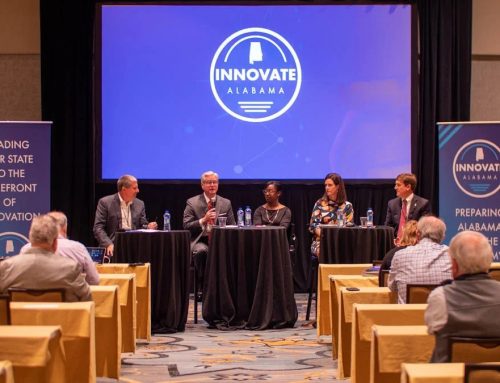Today’s guest columnist is Charisse Stokes.
Since childhood, I’ve been surrounded by few females and minorities in my academic and work environments, unfortunately, that’s typical in the technology field.
Being ‘the only’ black female in the room has encouraged me to expose more women and minorities to tech and innovation fields.
I am very fortunate to have earned a ceramic engineering undergraduate degree from Clemson University, a Master of Business Administration from Auburn University at Montgomery and have worked in the Information Technology field for over 20 years.
Science, technology, engineering, and mathematics (STEM) jobs are expected to double by 2026. We in Alabama must better equip our young people to compete.
Recently I’ve joined forces with President and CEO Deon Gordon of TechBirmingham to form The Alabama Collective. The Collective is a group of like-minded tech, innovation, and entrepreneurship organizations collaborating to elevate minorities in tech in the Montgomery and Birmingham communities.
“The Alabama Collective is focused on relationship capital, where people meet equity and diversity to engage one another,” said Mayor Randall Woodfin at the first Community Conversation conducted in early October. This event highlighted leadership from the state’s capital and the Magic City, complementing each other’s missions to show how impactful they can be as a regional force.
City of Montgomery Mayor Steven L. Reed recently told his constituents, “The South is HOT,” and he’s right. Alabama isn’t just known for its hot and humid weather; it’s quickly gaining notoriety for the immense opportunities available for entrepreneurs.
Generations ago, African Americans established blocks of black-owned businesses and created economic prosperity within the South. While most know Alabama for its civil rights past, they haven’t recognized its rise in developing an environment that embraces its culture to uplift and grow talent.
Neighboring states have seen success in banding together and knocking down territorial walls that often plague our nation’s growth. Some may ask, “What does that really look like in our home state?”
Well, to the aspiring engineer or IT professional, it’s the ability to fill one of the 2000+ vacancies across the state in this field. For the startup company, it’s multiple resources, accelerator and incubator programs that can assist in growing their business. For the collaborating cities, it means a diversified, knowledge-based economy that can withstand pandemics and national unrest.
It’s our goal to ‘show ‘em what right looks like’ and be an example for our state’s future.
Black excellence has blazed the trail many times in Alabama, and this time is no different.
Exposure to training and opportunities needs to start when children are very young.
Often, the policy side of the solution is the last to provide real help to the people in need.
Who wants to wait on slow internet? Or even worse, who wants to drive from county to county for better Wi-Fi?
As a member of the Alabama Innovation Commission, we successfully passed three significant legislative bills related to human capital, incentive programs, and increased broadband infrastructure within the last year. As a result, we can provide better access to broadband in our rural communities and implement more real-world application initiatives and partnership activities.
These all contribute to us having the ability to grow our workforce development pipeline immensely.
Don’t get it twisted; Alabama won’t be giving up its rich traditions of football Saturdays, sweet tea, and long draws, but it will say goodbye to silos, bureaucratic business processes, and city divides.
The “new” Alabama welcomes inclusivity with environments that appreciate diversity of thought, provide resources to all, and reach across the aisle to become a stronger force building generational wealth and opportunity.
Charisse Stokes, Executive Director of TechMGM, was named a Power Leader in the State of Alabama by Alabama Power Company and has been recognized as a community leader serving on several international, regional, and statewide boards including the Governor’s STEM Council, Alabama Innovation Commission, Computer Science Task Force and the Trenholm State Community College Computer Information Systems Advisory Board.
David Sher is the founder and publisher of ComebackTown. He’s past Chairman of the Birmingham Regional Chamber of Commerce (BBA), Operation New Birmingham (REV Birmingham), and the City Action Partnership (CAP).







Leave A Comment